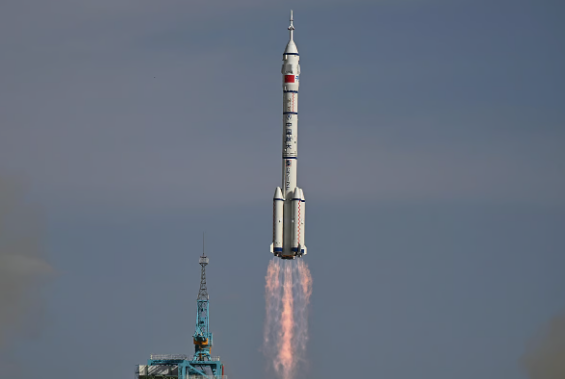China successfully launched three astronauts into orbit on Thursday, marking another major step in its ambitious push to become a dominant force in space exploration.
The Shenzhou-20 mission lifted off from the Jiuquan Satellite Launch Center in northwest China, carrying the crew toward the Tiangong space station for a six-month mission. The launch, which took place amid cheering crowds and patriotic fanfare, is part of Beijing’s broader strategy to cement its role as a global leader in space technology.
The mission is being led by 46-year-old Chen Dong, a seasoned astronaut and former fighter pilot who previously became the first Chinese spacefarer to spend over 200 days in orbit. Joining him are first-time astronauts Chen Zhongrui, 40, a former air force pilot, and Wang Jie, 35, a former space technology engineer.
The Long March-2F rocket lifted off in a dramatic plume of flame and smoke, witnessed by crowds of spectators who gathered near the desert launch site. Dressed in white space suits, the astronauts waved to supporters as a military band played and banners praised their mission. “We wish you success!” the crowd chanted as the crew made their way to the launch pad.
Once aboard Tiangong—meaning “celestial palace”—the crew will conduct a variety of scientific experiments, including studies in physics and life sciences. For the first time, the astronauts will also observe planarians, flatworms known for their regenerative abilities. The mission will also include spacewalks, equipment maintenance, and station upgrades to enhance protection against space debris.
The new crew will replace three astronauts currently stationed on Tiangong, who are scheduled to return to Earth on April 29 following a handover period.
China’s space program, which has seen rapid advancement in recent years, is a cornerstone of President Xi Jinping’s vision of achieving the “space dream.” Beyond its operational space station, China has also landed rovers on the Moon and Mars and has announced plans to send a crewed mission to the Moon before 2030.
Excluded from the U.S.-led International Space Station since 2011, China has moved to build its own partnerships. In February, it signed an agreement with Pakistan to train two astronauts, paving the way for international collaboration aboard Tiangong.
With Tiangong now fully operational and crewed year-round, China continues to assert itself as a major player in the new era of space exploration.





